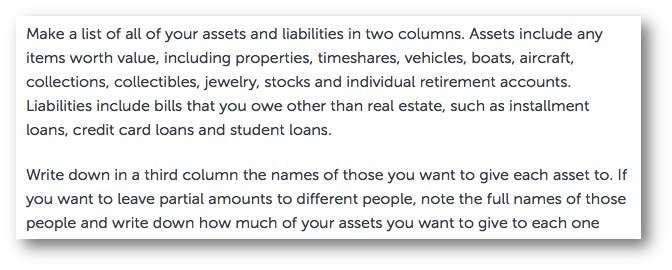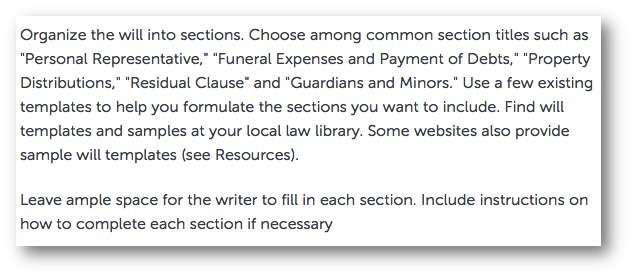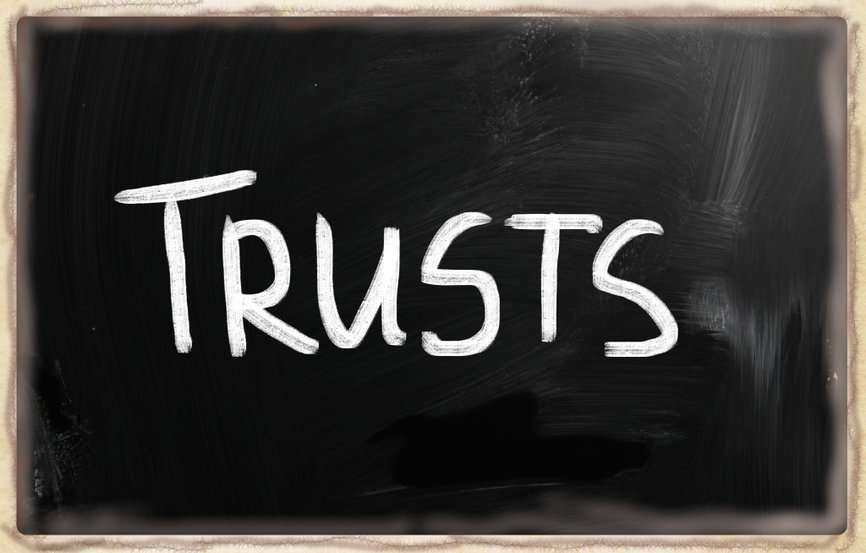Much of our customer support effort is spent on correcting misunderstandings that have usually arisen from bad information that has been posted on the Internet. As with anything that you do once or twice in your lifetime, the terms will be unfamiliar, and there will be a lot to learn. But the task is made that much more difficult by woefully incorrect information that proliferates on different “advice blogs”. The example at the top of the page is from a reasonably well respected resource at Nerdwallet (we couldn’t help but post a comment under their article, so they may have fixed it if you click through). But this staff writer, who doesn’t appear to have any legal training has written;
In your Will, you need to name someone to have Power of Attorney.
This is a bad start; Your legal Will, or Last Will and Testament, comes into effect after you have died. The Power of Attorney is in effect while you are alive, and ceases to be effective at the moment you die. You cannot name a Power of Attorney in a legal Will, they are two completely different documents that serve different purposes and are never active at the same time. He then states;
That person will be responsible for handling your finances in case you are incapacitated
This much is correct…but…
and will ensure that the provisions in your Will are carried out after your death
Utterly incorrect. The Executor in your Will has this responsibility…remember, your Power of Attorney is no longer an active document once you have died.
The other day, we took a call from somebody who had read information on eHow about preparing a legal Will. When we explored the site further, we found that although this is one of the most popular sites on the Internet, their legal information is, at best, inadequate, but more likely quite dangerous. eHow is often criticized for having poor quality information, but it still remains incredibly popular.
But it turns out that anybody can write an article on eHow, so somebody with a bachelors in fine arts can give advice on how to prepare a legal Will.
We picked out just a few glaring errors in their various articles on preparing your Will:
Listing your assets when writing your legal Will
This is one of the most common errors that we see in Will writing. Many people feel that a legal Will is a list of all of your assets, which then goes on to describe which asset will go to which individual.
In reality, you have no idea when this Will is going to come into effect. It could be next week, or it could be five decades from now. Your assets will change throughout your life, and you would not want to have to update your Will every time an asset changed.
Most Wills include specific items that are to go to specific beneficiaries, but the remainder is lumped together as a “residual estate”. This residual estate then goes to a single beneficiary – “my entire estate to my husband John Doe” or is divided between multiple beneficiaries – “my entire estate to be divided equally between by three children”.
There have been well documented cases of people trying to prepare their own legal Will by including a list of all of their assets, without naming a residual beneficiary, and the courts overturning the Will.
In fact, we believe this misconception is one of the key reasons why people do not prepare their Will. Partly because they are waiting until their assets stabilize a little, and partly because the process of documenting one’s assets is overwhelming.
The same advice was repeated throughout eHow
We actually think that half of this is a good idea and we provide a similar service through our LifeLocker partnership. Just don’t include the information in your Will and don’t combine it with the list of beneficiaries. We now include the ultimate Executor tool as part of our Will writing service.
Forgetting that your legal Will is a public document
This one also makes the error of advising you to list all of your assets in your Will, but goes one extra dangerous step of telling you to write down all of the information about your bank accounts, investments and money in your Will. Please keep in mind that once your Will is probated, the general public can read this document. You may not want to be telling the World that you have $50,000 under your bed.
The additional error made in this advice is suggesting that you designate a friend to oversee the transfer of money to a charity. In fact, your Executor will be responsible for doing this, and there should be very specific language written into the Will describing how assets should be disbursed to a charity. Your Executor has responsibility for gathering up all of your assets and distributing them according to your wishes.
Including funeral arrangements in your legal Will
Many people ask us about the advice posted in this article. There are a few reasons why it doesn’t make sense to include your funeral wishes in your legal Will. Firstly, they are wishes and an expression of your preference. They are not legally enforceable instructions in the same way as the contents of your Will. Furthermore, your Will has to go through a probate process before it is accepted by the courts, by which time your funeral will have been taken care of.
We provide a separate service for documenting your funeral wishes at USLegalWills.com. You can certainly store this document with your Will as your Executor will take responsibility for arranging your funeral, but do not include funeral directions in the Will itself.
Advice on naming trustees and guardians
 This article is particularly troubling as it steps beyond the bounds of a five point, step-by-step guide to preparing your legal Will and delves into the areas of setting up minor trusts for young beneficiaries. Setting up a trust is not for the faint-hearted, and although we support it through our Will writing service, the associated clauses are detailed and could not possibly be written by an untrained individual. Also, we typically advise that the guardians for your children are actually a different person than the Executor of your Will. It is a difficult responsibility to balance the needs of the child growing up with the protection of their trust fund, and having two people working together provides some accountability to each other.
This article is particularly troubling as it steps beyond the bounds of a five point, step-by-step guide to preparing your legal Will and delves into the areas of setting up minor trusts for young beneficiaries. Setting up a trust is not for the faint-hearted, and although we support it through our Will writing service, the associated clauses are detailed and could not possibly be written by an untrained individual. Also, we typically advise that the guardians for your children are actually a different person than the Executor of your Will. It is a difficult responsibility to balance the needs of the child growing up with the protection of their trust fund, and having two people working together provides some accountability to each other.
Assuming that your legal Will is effective today
This is related to the previous issues of listing your assets, but the article takes it one step further. It’s an incredibly bad idea to list your credit card debt in your legal Will. It is true that your Executor will be responsible for settling your debts from your estate, but most of these debts are even more volatile than your assets. If I listed in my Will that I owe $1,000 to Mastercard, would I have to update my Will next time I pay my bill? It would be like listing my utility bills in my Will. To reiterate, your legal Will is probably not going to be read for another ten or twenty years or beyond. Make sure that the document has some future-proofing built into it.
Using something like the LifeLocker service at USLegalWills.com allows you to at least list the credit cards that you may have. It would then be up to the Executor to find out the balance on your card, and pay the balance from your estate.
Bad advice on signing
The first sentence needs clarifying. All States require a minimum of two witnesses to the signing of your legal Will. But the second sentence is the most worrying. “Preferably, these witnesses will not be beneficiaries”. It’s a little more than “preferably”, because in every single State, if your beneficiaries are witnesses, then certainly the bequest to that witness will be invalidated, and in some cases your entire Will is going to be thrown out and you will be deemed to have died without a Will. Your assets will then be distributed according to the State’s laws.
Not only should your witnesses absolutely not be beneficiaries, they should also not be the spouse of a beneficiary. In fact, they should have absolutely no vested interest in the contents of the Will.
Outdated information
This piece of advice is similar to the previous example, but adds two more errors. Firstly, the document does not have to be notarized in order to make it a legal document, and there is no State that requires three witnesses. It shows how difficult it is to rid the internet of outdated information because people write their articles based on information published in other articles without a fact check. Vermont used to require three witnesses but changed their laws in 2005.
Vague advice
There are very clear laws on what can and cannot be included in a legal Will. I’m not entirely sure what kinds of instructions the author was thinking would be included in this section, but it does suggest the introduction of “conditional bequests”, or bequests that your beneficiaries will receive if and only if they perform certain tasks. We would not recommend including this in your Will at all.
The obvious example is a bequest that would be for example, contingent on the beneficiary graduating college, or getting married. But these conditions are so open-ended that the estate can never be closed. Supposing the beneficiary gets married at 70 years of age, who managed the estate up until this time?
In general, we would recommend not including any special instructions unless you have an experienced estate planning attorney writing them up for you.
Catastrophic advice
I’m not quite sure where the author of this article found their information. If you follow this advice at a minimum, the bequest to that witness becomes invalid, but in some cases, the entire Will is going to be invalidated . In general, nobody who is going to receive something from the Will, should witness the signing. There is a clear conflict of interest, and the witnesses are there to certify that the person preparing the Will did so without any undue influence and had the capacity to know what they were doing.
Advice on how to give legal advice
This one is a little confusing because it is offering advice on how to create a template for a legal Will that other people can then use to prepare their own Will. It is a truly frightening prospect that somebody would actually use this advice, and then set up a website offering a “free downloadable legal Will template”, and then people would use this template to prepare their own Will.
Once in a while somebody will contact us and ask why they should pay for our service, when there are free Will templates on the Internet. This article perfectly demonstrates why you should never use a free Will service, nor should you use a blank template for preparing a Will. Anybody could create this template, but it would be almost impossible to prepare a well drafted legal Will based on the skeleton framework offered by this template.
The problem is, you would have no idea that the piece of paper that you think is your legal Will, is actually a worthless piece of paper.
When lawyers warn you against writing your own legal Will, they can use material like this to demonstrate the dangers. However, not all approaches to writing your own Will are exposed to the same risks.
Clearly there are some very bad services out there, and we were able to pick these examples from just one website.
USLegalWills.com has been offering estate planning services for 14 years now, and although many of our Wills have gone through the probate process, not once have we receive feedback of a problem arising with one of our Wills. So if you are considering preparing your own Will, please be very careful how you choose your service provider, and don’t believe everything you read on the Internet.
- Testamentary Trusts – what are they and how are they created? - May 9, 2024
- Every document you need for a complete estate plan. - October 29, 2020
- Estate Planning in troubled times - April 3, 2020
























